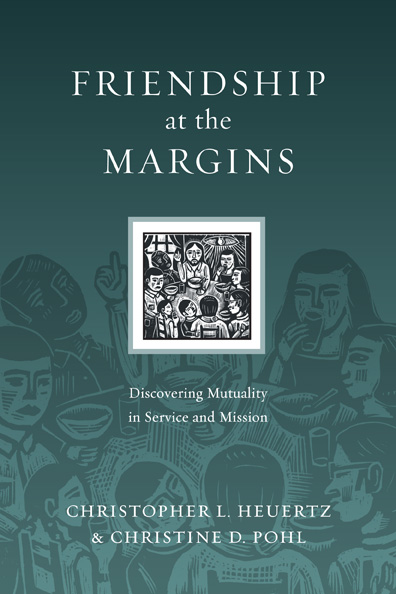By Josh Casper
Friendship at the Margins is the kind of book I’ve been waiting for in the midst of my own spiritual crossroads (tumbleweed and all). There are models of missionary life that I’ve come to terms with – the word itself “missionary” being a hesitancy in my messy evangelical conscious.
 The missionaries I knew growing up spoke at our church every so often, dressed of course, in a traditional Salwar suit or a shiny Japanese kimono. We would be greeted in the native tongue that symbolized the epitome of long-term missions: knowing the language (or at least the proper greeting).
The missionaries I knew growing up spoke at our church every so often, dressed of course, in a traditional Salwar suit or a shiny Japanese kimono. We would be greeted in the native tongue that symbolized the epitome of long-term missions: knowing the language (or at least the proper greeting).
I’m still not so sure what my hang up is about the word “missionary”, only to be called one at certain times in my journey. I felt let down by the word knowing what I did was not a mission, but a view into life with our friends that are poor and marginalized. It was all but romantic.
There was cha and biscuits on the rooftops of brothels and holding the hands of the dying as they stare into your eyes. It was far from the models of missionary life I grew up knowing. It was grassroots and personal. It changed my heart and taught me the reality of living among the broken Beloved.
The authors, Chris Heuertz and Christine Pohl navigate within each other’s stories new and re-imagined ways of doing life with our friends at the margins. Each touch on topics that I believe mission-based organizations could grow with and discuss within relational and intentional circles.
FATM provides us with heartbreaking, engaging and hopeful stories of their friends who are often swept under the disguises of oppression and injustice. It is a place that provides us with grassroots experience and important vocational outlook.
Pohl talks about her experiences with mission-minded organizations and expresses her fear of a reductionist view of humanity. She expresses much of what I fear about street evangelism, in that it lacks real relationship and intimacy.
This is no model for effective and lasting relationships. How many times have you wanted to avoid that Greenpeace guy or girl? Exactly. There’s nothing sustainable or inviting about a rushed and intrusive conversation. It is not a mutual conversation and it rarely ever works.
Heuertz goes on to express the importance of mutuality in service and mission by reminding us of the saying often contributed to St. Francis, “Preach the Gospel always and when necessary, use words.” This statement means more than being a good “witness”, as we say. It’s about the mutuality of relationship. Our love for God should be rooted within our relationships. Our “witness” is one of friendship, not of purpose driven evangelism.
Heuertz writes, “In God’s economy, it’s less clear who is donor and who is recipient because all are blessed when needs are met and when individuals receive care.” It is the often-conflicted “donor/recipient” relationship that we overlook when addressing such mutuality. We are to be careful to not overlook the ones we admit to helping, as they remind us that the experience goes full circle. One does not strictly give, nor does one fully receive. It is this holistic friendship that Heuertz and Pohl emphasize which fully engages our hearts with our friends at the margins.
Simplicity and community are both mutually important when forming relationships. “Friendship with people that are poor often exposes our excess”, writes Heuertz. When we take a look at our possessions beside the needs of our friends, we are to be aware that what we have could cause strain and build walls within our community.
With most friends, it is important to celebrate one another. Pohl writes, “Gratitude often spills into celebration – for what God has done in our lives, for the gifts we have received and for the grace of friendships. Surprisingly, it is our friends who are poor who teach us the most about celebration. […] The importance of celebration among people who are poor, or who have been misused, is a constant reminder that celebration belongs at the heart of discipleship and community.”
Friendship at the Margins will challenge and encourage you. More so, it will give you insight into the world of meaningful friendships that are not only mutual, but also life giving.
About the authors: Christopher L. Heuertz is the international director of Word Made Flesh, an organization that exists to serve Jesus among the most vulnerable of the world’s poor. He is the author of Simple Spirituality.
Christine D. Pohl is professor of social ethics at Asbury Theological Seminary in Wilmore, Kentucky. Her books includes Making Room and Living on the Boundaries.
![]() Josh is a Mississippi boy who now lives in Portland, Oregon. He is currently enjoying being married to his wife Hannah, who both met in 2007 while serving with Word Made Flesh in Calcutta, India. His interests include: books, gardens, racial reconciliation, southern cuisine, coffee and birds (in no particular order). Josh is also an aspiring: writer, Stumptown barista-extraordinaire and world-renowned southern chef.
Josh is a Mississippi boy who now lives in Portland, Oregon. He is currently enjoying being married to his wife Hannah, who both met in 2007 while serving with Word Made Flesh in Calcutta, India. His interests include: books, gardens, racial reconciliation, southern cuisine, coffee and birds (in no particular order). Josh is also an aspiring: writer, Stumptown barista-extraordinaire and world-renowned southern chef.
